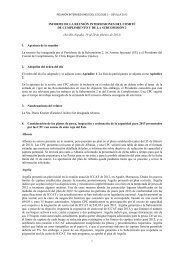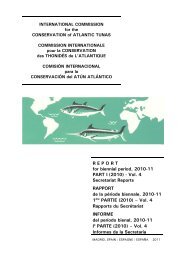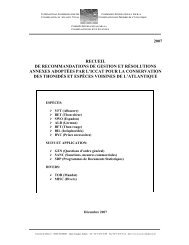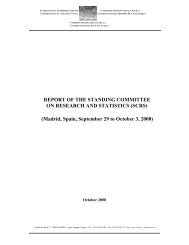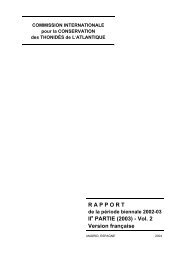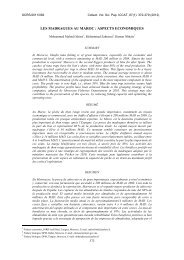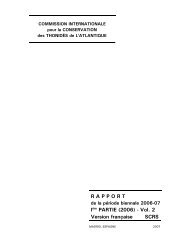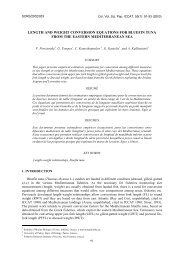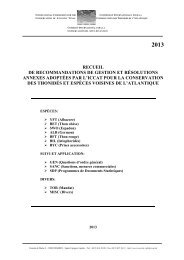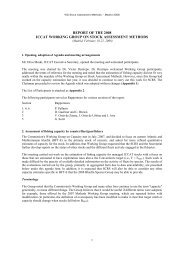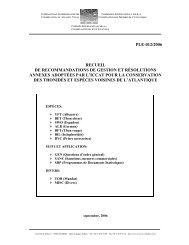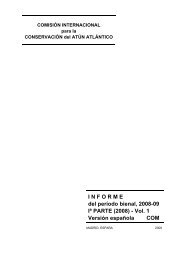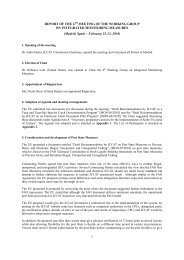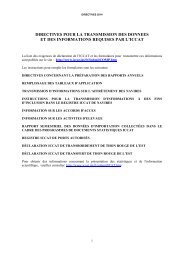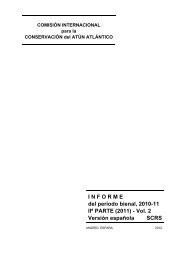E - Iccat
E - Iccat
E - Iccat
You also want an ePaper? Increase the reach of your titles
YUMPU automatically turns print PDFs into web optimized ePapers that Google loves.
PWG REPORT<br />
are not yet as effective as the IMO numbers. But, they are a step in the right direction. As the RFMOs adopt<br />
more comprehensive requirements to register vessels, these UVIs will become more effective and more truly<br />
unique.<br />
ISSF has called upon the tuna fishing industry to obtain IMO numbers for large-scale vessels. We maintain a<br />
database with IMO numbers at http://iss-foundation.org/imo-database/, with over 1,600 vessels so far. ISSF<br />
hopes that ICCAT and the other RFMOs will be able to use this information to strengthen the global<br />
consolidated list of vessels.<br />
Statement by Observer from PEW to PWG<br />
Appendix 5 to ANNEX 11<br />
We call your attention to our policy statement, “Better Management for all ICCAT Species: Time to Fill In the<br />
Puzzle Pieces”, which was circulated electronically to all Contracting Parties (CPs), and is available on our<br />
website at www.pewenvironment.org/ip (in English, French, and Spanish) along with copies of our other<br />
materials. The following supplements that policy statement as relates to the work of the PWG.<br />
This year, several measures will be presented to the PWG that have the potential to greatly improve monitoring<br />
and compliance in fisheries managed by ICCAT. Pew urges the PWG to carefully consider these proposals and<br />
adopt strong measures that will be effective and enforceable. Recent reports of illegal fishing in Libyan waters<br />
in 2011, unregistered boats in the Mediterranean in 2012, unreported trade of Atlantic bluefin tuna over the last<br />
decade, and the need to more effectively monitor and promote compliance with other conservation and<br />
management measures (CMMs), point to the immediate need for better tracking of vessels, catch and<br />
international trade of ICCAT species.<br />
ICCAT must crack down on persistent illegal fishing activity (which includes any fishing not in full compliance<br />
with ICCAT CMMs), by addressing the following issues:<br />
Port State Measures: ICCAT should adopt at this meeting a revised port inspection scheme on the basis of the<br />
proposal put forward at the 2012 meeting of the Working Group on Integrated Monitoring Measures (IMM) in<br />
Tokyo, Japan. This proposal represents an acceptable minimum standard on port inspections but needs to include<br />
the prohibition of landing, transhipping or access to port services for vessels in violation of ICCAT<br />
recommendations. Otherwise there will be nothing to prevent illegal vessels from continuing their activities and<br />
pocketing the benefits of their illegal practices. ICCAT must protect the interests of its legitimate operators.<br />
IMO numbers: No effective compliance with ICCAT measures can be ensured without the capacity to positively<br />
identifying a fishing vessel. ICCAT should improve the identification of fishing vessels by requiring that they<br />
obtain and use IMO numbers. As a first step, ICCAT should make this requirement for large-scale fishing<br />
vessels and mandate that the IMO number is provided in all relevant ICCAT records and communications. There<br />
is increasing international support for using the IMO number as the unique vessel identifier for fishing vessels,<br />
and hence it is the right time for ICCAT to give due consideration to this matter and define, at this meeting, a<br />
process to establish the IMO number as the standard ICCAT vessel identifier.<br />
IUU Vessel List: A number of recent studies strongly point to persistent illegal fishing and overcapacity in the<br />
Mediterranean, despite stricter regulations and increased enforcement efforts. A new independently-reviewed<br />
trade analysis presented to the SCRS in September 2012 estimates that quotas were exceeded by 62% between<br />
2005 and 2011 and by 77% between 2008 and 2011. The actual catch is most likely higher, since official trade<br />
records do not reflect black market trade.<br />
Use of illegal driftnets: ICCAT also needs to address the long ongoing use of illegal driftnets to catch bluefin<br />
tuna and swordfish, a practice that has been banned by ICCAT for nearly a decade. Several countries have made<br />
significant progress. Despite this prohibition, from 2005 to 2011, Italian authorities, EU inspectors, and nongovernmental<br />
organizations documented more than 650 infringements of the driftnet ban. In May 2012, 40 tons<br />
of illegally caught bluefin tuna was seized by the Italian Coast Guard. To help combat this illegal activity, all<br />
vessels identified as participating in illegal, unregulated, and unreported (IUU) fishing, including the use of<br />
illegal driftnets, should be placed on ICCAT’s IUU vessel list and appropriate sanctions should be applied to<br />
CPCs whose vessels continue to violate ICCAT regulations.<br />
351



